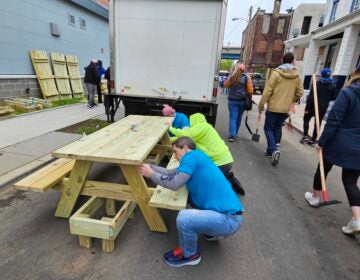Iraqi teen’s Eagle Scout ceremony part of the ongoing ‘dream’ of living in the U.S.
The silence and serenity inside St. Paul’s Episcopal Church starkly contrasted Mohammed Al-Jumaili’s life in Iraq.
In the not-so-distant past, Al-Jumaili, of Fallujah, Iraq, was living in a state of fear as the Iraq War waged on around him and his family. A state that was only exacerbated when, in 2006, he lost the lower half of his right leg in a car bomb explosion.
Since coming to the United States, though, Al-Jumaili’s life has been looking up and begun to more closely mirror the Chestnut Hill building’s peaceful atmosphere.
Still, as the Abington High School senior walked down the center aisle on Saturday to receive his Eagle Scout award from Boy Scout Troop 117, the life he left behind wasn’t completely out of mind either.
An important connection
Al-Jumaili, 17, is believed to be the first Iraqi immigrant to earn the prestigious honor bestowed by the Boy Scouts of America.
But Al-Jumaili is used to accomplishing feats despite the odds.
Apart from his latest scout ranking, he’s also led a high school robotics team and wrestles with one leg.
“Wrestling is all about how low you can be,” he said, noting that he doesn’t feel disadvantaged by his disability.
Al-Jumaili got involved with the Boy Scouts in 2009 through the Affel family. Charles Affel was involved with Troop 177, based near their Wyndmoor home, and currently chairs the group.
The Affels hosted Al-Jumaili and his mother, Jinan, in their Wyndmoor, Pa. home for about two years through Hosts for Hospitals, a nonprofit.
After the attack that cost him his leg, national attention by CNN assisted Mohammed Al-Jumaili in finding a benefactor who would help him and his mother travel to America and allow him to walk again with a prosthetic leg.
The pair stayed with the Affel’s following a return trip to America for a second round of medical procedures and Shriners Hospital in Philadelphia.
They’ve been able to stay in the United States through political asylum.
It was also through the Affels that Mohammed was introduced to the St. Paul’s community It’s why he decided to complete his service project – required to become an Eagle Scout – there.
He landscaped, cleaned and installed a new fence for its garden.
The project was completed in the spring
‘Open doors, open minds’
Over the years, Mohammed Al-Jumaili has established a deep connection with the St. Paul’s community, located at 22 E. Chestnut Hill Ave., even though he is a Muslim.
“One of the basic philosophies of this church is we have open doors, open minds and open hearts,” said Emmanuel Mercer, an assistant rector at St. Paul’s. “And I think that is what Mohammed has experienced as being a part of this community – that he’s becoming welcomed and accepted and embraced, even though he says his Muslim prayers.”
Al-Jumaili agreed.
“I don’t feel any different,” he said. “We’re all human and I love them, they love me.”
Bernard Homer, 83, recalled meeting Mohammed Al-Jumaili at a cookout. The two were introduced through Christine Kindler, an Affel family friend and Chestnut Hill resident.
“Sitting at that table with two Christians, a Maya boy, three Jews and a Muslim all hugging and kissing in the United States. That’s a hell of a feeling,” said Homer, who has since become a mentor of sorts for Al-Jumaili.
The “Maya boy” just so happened to become one of Al-Jumaili’s best friends. Al-Jumaili met Franklin Morena, a refugee from Honduras, at a graduation party for one of the Affel’s sons.
“Their friendship is bonded in, I think, their cultural differences,” said Kindler, also a St. Paul’s parishioner. “He and Mohammed then also had to endure the stress of the immigration process and kind of the uncertainty of ‘Are you staying, are you going?’ They couldn’t really call it home.”
Although Morena, 19, now attends Valley Forge Military Academy, he said he still keeps in touch with Mohammed. The two still play soccer together when possible.
“I’m very proud of him. He’s very hard-working,” Morena said.
The possibility of a future
The two can both find comfort in their current situations, too. They’ve both received green cards.Jinan Al-Jumaili said she and her son had no future in Iraq.
“In my country, [there is] no future for my son because he [lost] his leg,” said Jinan.
Disabilities and impairments are often paired with discrimination in the Middle East.
Jinan also remembers receiving threats from people in her country after she spoke highly of America during CNN interviews.
“We will kill you and kill your son,” she recalled someone telling her.
Even though Mohammed Al-Jumaili said he considers himself an American, the idea of living in the country still feels surreal.
“I’m still living the dream until this moment,” he said.
WHYY is your source for fact-based, in-depth journalism and information. As a nonprofit organization, we rely on financial support from readers like you. Please give today.




